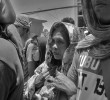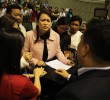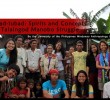The elections are a period when conflicting forces play out an act in a long-running drama. For those who control power, each election is crucial. They cannot afford to lose. They can, in another sense, afford to win through �guns, goons, gold and Garci.�
BY PROF. GILL H. BOERINGER
Bulatlat
ELECTION WATCH
Volume VII, No. 16, May 27-June 2
Months before the elections last May 14, the Armed Forces of the Philippines (AFP) moved into areas across the country, particularly in rural areas as well as in Metro Manila. The soldiers were supposed to protect the communities and maintain order. However, it seems that their deployment was part of a more strategic policy of harassment, intimidation, elimination, surveillance and direct participation in the campaign.
Indeed, the military campaigned against the progressive party-list groups (PPLs) using a variety of tactics to associate the PPLs with the communists. We were amazed to see a news report by Edith Regalado published in the Philippine Star (May 13) quoting Lt. Gen. Rodolfo Obaniana, chief of the AFP�s Eastern Mindanao Command, as saying that it is part of the AFP�s policy to �expose (the) hidden agenda� of PPLs. He also admitted �vigorously campaigning against party-list organizations� and that he is �not politicking as (he) will continue this crusade even after the elections.�
The Commission for Elections (Comelec), on the other hand, was not thoroughly investigated despite accusations of widespread cheating in the 2004 elections which allegedly allowed more than one million votes to be �padded� for the President, thus assuring her victory.
In the recently held elections, there were violations of electoral laws, procedural breakdowns, and many inefficiencies all of which and more indicating that Comelec was certainly inefficient and probably corrupt at various levels. There seemed to have been decisions taken with regard to certification of party-list groups which were wrong. The Supreme Court seems to have recognized this but in one significant case upheld the Comelec decision on a �technicality.�
Vote-buying is very widespread and it is acknowledged throughout Filipino society that it happens on a massive scale. The Asian-based observers mission (ANFREL) said that vote-buying was blatant and their presence did not make any difference. This seems to happen in the local elections much more than at the national level where other techniques of cheating and gaining unfair advantage are used.
One of the more popular forms of election cheating is called dagdag-bawas, a Filipino expression for padding and shaving votes. It is widespread and is used at all levels. Dagdag-bawas is a way to win elections after the votes have been cast. This was demonstrated in 2004 when the President was elected on the basis of votes �obtained� in this manner in Mindanao.
There are also numerous ways of preventing people from voting and abusing the right to vote. The list of registered voters, for example, is unreliable. The presence of the military threatens people, preventing them from voting. On the other hand, �spurious enfranchisement� happens as dead people�s names are used by unscrupulous individuals to vote. It is also possible for one person to vote several times.
On election day itself, there was general chaos and confusion as the electoral precincts are often full of people moving in and out of the polling precincts. This situation allows a great deal of illegal activity to take place like the lack of privacy of voters and illegal campaigning of poll watchers and even members of the Board of Election Inspectors (BEI). The presence of the police and military does not always seem to lessen this and even becomes part of the problem in some cases.
There seems to be a general acceptance that the electoral process is largely corrupt. A gubernatorial candidate�s wife who talked to us admitted that her husband would buy votes like other candidates. She said vote buying is normal. I remember a conversation with an elderly taxi driver who took me to the airport who said, �Pity my poor country.� A young Filipino worker who was on a plane with me from Melbourne to Sydney told me, �I missed the election (in Masbate) but it is always the same, violence and corruption.�
Perhaps the atmosphere is best summed up by the full-page advertisement in the Philippine Star (May 13) which was placed by the Philippine Democratic Caucus and the Filipino Movement for New Politics. It was an edited version of a speech given by former Sen. Francisco Tatad to the Rotary Club of Pasig, Metro Manila dated April 19, 2007. It was a scathing attack on the candidates of the traditional mainstream parties for the prestigious position of Senator. The headline reads: �NONE OF THEM DESERVE OUR VOTE.�
It should not be surprising therefore to find many Filipinos in a state of fear and anxiety. Given what I�ve already discussed, people have great and justifiable concerns. This is perhaps most obvious in those rural provinces where feudal social relations exist and people are at the mercy of landlords and other members of the elite who wield power and influence. We found out that a woman was paid P500 ($10.86, based on an exchange rate of P46.05 per US dollar) to vote for a candidate. But since she was unable to vote, she was very concerned about her payment. She said that there were ways in which politicians know how people voted, thus the possibility of retaliation from those who failed to follow instructions.
Getting involved in election-related activities at whatever level presents grave dangers. A person could be �red-baited� or be the subject of black propaganda which could extend to his or her family. There is also the possibility of being fired from your work or being deprived of employment or benefits and services. Threats, beatings, intimidation, harassment and even killings could happen. One needs only to be perceived to be involved to suffer consequences. And of course since mistakes are made, �collateral damage� occurs in the form of bystanders or other innocent people being victims of election-related violence.
With regard to the actual counting of votes, there seems to be three stages, all of them done by hand (and by very tired people). This process takes several weeks. In addition, problems like brownouts and death delays the counting. There are therefore opportunities for cheating and manipulation.
2007 Elections
![[STANDPOINT] Illegal drugs and the NIMBY mindset](https://davaotoday.com/wp-content/uploads/2016/09/Mags-Maglana_UPMIN-Sept.-20-110x100.jpg)








